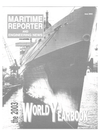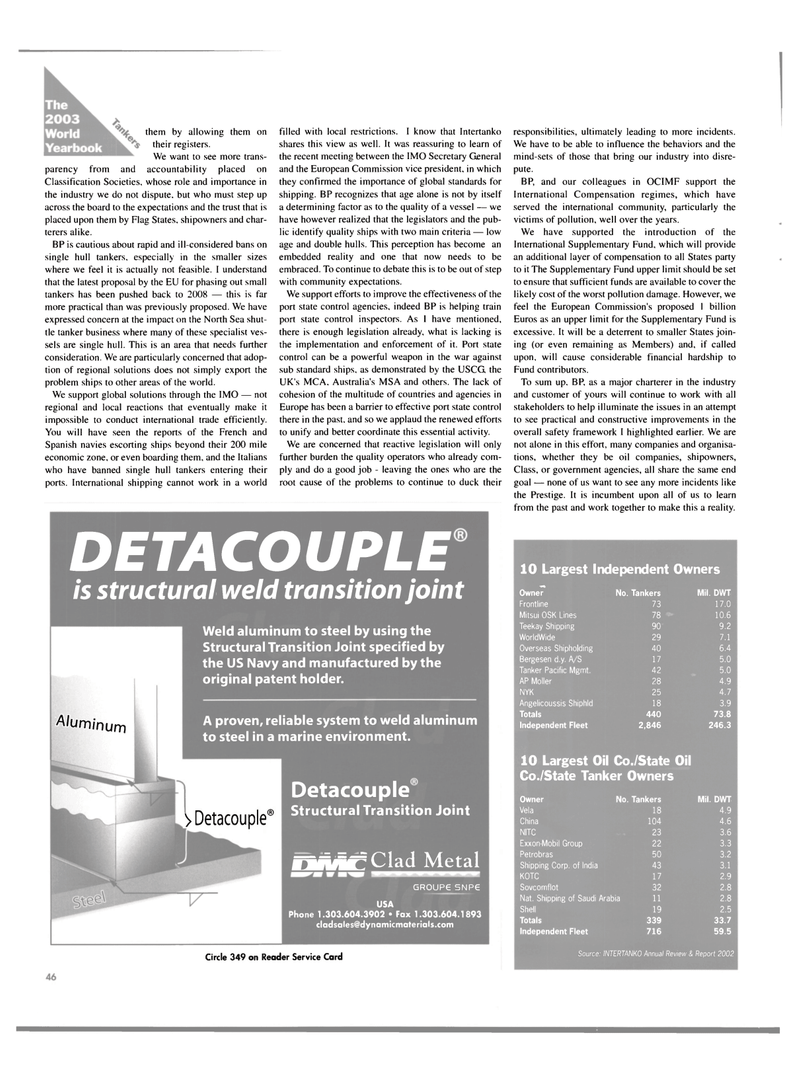
Page 46: of Maritime Reporter Magazine (June 2003)
Read this page in Pdf, Flash or Html5 edition of June 2003 Maritime Reporter Magazine
them by allowing them on their registers.
We want to see more trans- parency from and accountability placed on
Classification Societies, whose role and importance in the industry we do not dispute, but who must step up across the board to the expectations and the trust that is placed upon them by Flag States, shipowners and char- terers alike.
BP is cautious about rapid and ill-considered bans on single hull tankers, especially in the smaller sizes where we feel it is actually not feasible. I understand that the latest proposal by the EU for phasing out small tankers has been pushed back to 2008 — this is far more practical than was previously proposed. We have expressed concern at the impact on the North Sea shut- tle tanker business where many of these specialist ves- sels are single hull. This is an area that needs further consideration. We are particularly concerned that adop- tion of regional solutions does not simply export the problem ships to other areas of the world.
We support global solutions through the IMO — not regional and local reactions that eventually make it impossible to conduct international trade efficiently.
You will have seen the reports of the French and
Spanish navies escorting ships beyond their 200 mile economic zone, or even boarding them, and the Italians who have banned single hull tankers entering their ports. International shipping cannot work in a world filled with local restrictions. I know that Intertanko shares this view as well. It was reassuring to learn of the recent meeting between the IMO Secretary General and the European Commission vice president, in which they confirmed the importance of global standards for shipping. BP recognizes that age alone is not by itself a determining factor as to the quality of a vessel — we have however realized that the legislators and the pub- lic identify quality ships with two main criteria — low age and double hulls. This perception has become an embedded reality and one that now needs to be embraced. To continue to debate this is to be out of step with community expectations.
We support efforts to improve the effectiveness of the port state control agencies, indeed BP is helping train port state control inspectors. As 1 have mentioned, there is enough legislation already, what is lacking is the implementation and enforcement of it. Port state control can be a powerful weapon in the war against sub standard ships, as demonstrated by the USCG the
UK's MCA. Australia's MSA and others. The lack of cohesion of the multitude of countries and agencies in
Europe has been a barrier to effective port state control there in the past, and so we applaud the renewed efforts to unify and better coordinate this essential activity.
We are concerned that reactive legislation will only further burden the quality operators who already com- ply and do a good job - leaving the ones who are the root cause of the problems to continue to duck their responsibilities, ultimately leading to more incidents.
We have to be able to influence the behaviors and the mind-sets of those that bring our industry into disre- pute.
BP, and our colleagues in OCIMF support the
International Compensation regimes, which have served the international community, particularly the victims of pollution, well over the years.
We have supported the introduction of the
International Supplementary Fund, which will provide an additional layer of compensation to all States party to it The Supplementary Fund upper limit should be set to ensure that sufficient funds are available to cover the likely cost of the worst pollution damage. However, we feel the European Commission's proposed I billion
Euros as an upper limit for the Supplementary Fund is excessive. It will be a deterrent to smaller States join- ing (or even remaining as Members) and, if called upon, will cause considerable financial hardship to
Fund contributors.
To sum up. BP, as a major charterer in the industry and customer of yours will continue to work with all stakeholders to help illuminate the issues in an attempt to see practical and constructive improvements in the overall safety framework I highlighted earlier. We are not alone in this effort, many companies and organisa- tions, whether they be oil companies, shipowners,
Class, or government agencies, all share the same end goal — none of us want to see any more incidents like the Prestige. It is incumbent upon all of us to learn from the past and work together to make this a reality.
DETACOUPLE is structural weld transition joint
Weld aluminum to steel by using the
Structural Transition Joint specified by the US Navy and manufactured by the original patent holder.
A/um/n um A proven, reliable system to weld aluminum to steel in a marine environment.
VDetacouple®
Detacouple
Structural Transition Joint
Oiifif?Clad Metal
GROUPG SNPG
USA
Phone 1.303.604.3902 • Fax 1.303.604.1893 [email protected]
Circle 349 on Reader Service Card 10 Largest Independent Owners •m
Owner No. Tankers Mil. DWT
Frontline 73 17.0
Mitsui 0SK Lines 78 10.6
Teekay Shipping 90 9.2
WorldWide 29 7.1
Overseas Shipholding 40 6.4
Bergesen d.y. A/S 17 5.0
Tanker Pacific Mgmt. 42 5.0
AP Moller 28 4.9
NYK 25 4.7
Angelicoussis Shiphld 18 3.9
Totals 440 73.8
Independent Fleet 2,846 246.3 10 Largest Oil Co./State Oil
Co./State Tanker Owners
Owner No. Tankers Mil. DWT
Vela 18 4.9
China 104 4.6
NITC 23 3.6
Exxon-Mobil Group 22 3.3
Petrobras 50 3.2
Shipping Corp. of India 43 3.1
K0TC 17 2.9
Sovcomflot 32 2.8
Nat. Shipping of Saudi Arabia 11 2.8
Shell 19 2.5
Totals 339 33.7
Independent Fleet 716 59.5
Source: INTERTANKO Annual Review & Report 2002

 45
45

 47
47
